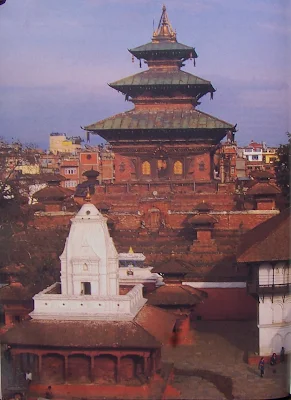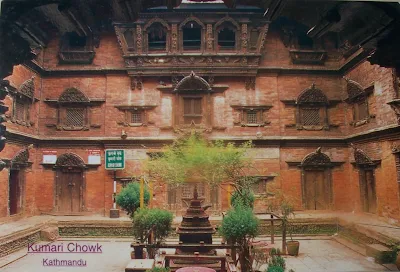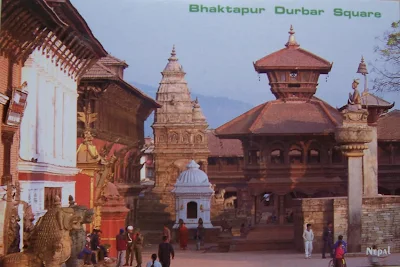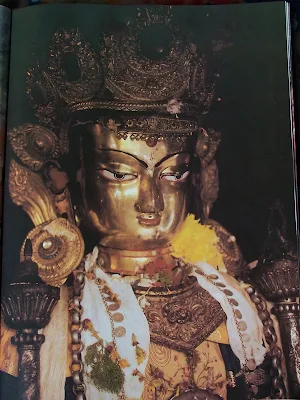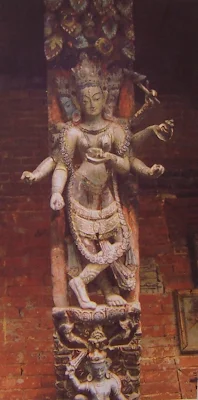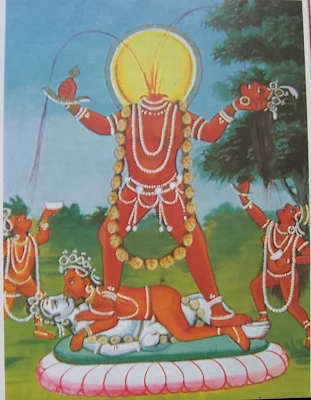Please, click on any selected image to view it Large or Largest:
Lumbini :- the birthplace of Lord Buddha - houses the famous marble sculpture
( 543 B.C. ) depicting Mayadevi giving birth .
Photo - Jagadish Tiwari
( www.himalayanmaphouse.com )
Ashok Stambha ( Ashok Pillar, 250 B.C. ), Lumbini, Nepal
Photo: Jagadish Tiwari
Himalayan Maphouse ( P ) Ltd. GPO Box 20784, Kathmandu
An earlier view of Mayadevi Temple, Lumbini, Nepal .
Photo:- The book - " Experience it in Nepal "
Published By :
Nepal Tourism Board
Tourist Service Center, P.O. Box - 11018
Bhrikutimandap, Kathmandu , Nepal
www.welcomenepal.com
Archaeological remains, Lumbini Garden .
Photo:- The book - " Experience it in Nepal "
Published By :
Nepal Tourism Board
Tourist Service Center, P.O. Box - 11018
Bhrikutimandap, Kathmandu , Nepal
www.welcomenepal.com
Krishnamandir, Patan
The three-storey stone temple continues to elicit high praise from lovers of art & beauty.
It was built by King Siddhi Narasingha Malla in the sixteenth century A . D.
Architects could not able to know how to build it .
Photo:- The book - " Experience it in Nepal "
Published By :
Nepal Tourism Board
Tourist Service Center, P.O. Box - 11018
Bhrikutimandap, Kathmandu , Nepal
The ancent Pancha-mukhi Hanuman Statue, Uttar-bahini, Gokarna
Photo: B. P. Dhungana
A pillar which has a historical importance, Uttar-bahini
Photo: B. P. Dhungana
Historic Kasthmandap ( Known locally as" Maru Sattal " )
The name Kathmandu was derived from Kastha Mandap.
It is collapsed completely by terrible earth-quake in 25 April, 2015.
Photo:- The book - " Experience it in Nepal "
Published By :
Nepal Tourism Board
Tourist Service Center, P.O. Box - 11018
Bhrikutimandap, Kathmandu , Nepal
www.welcomenepal.com
A stone image of Garuda-near Kasthmandap.
Photo:- The book - " Experience it in Nepal "
Published By :
Nepal Tourism Board
Tourist Service Center, P.O. Box - 11018
Bhrikutimandap, Kathmandu , Nepal
www.welcomenepal.com
Singhadarbar - the central secretariat .
Photo:- The book - " Experience it in Nepal "
Published By :
Nepal Tourism Board
Tourist Service Center, P.O. Box - 11018
Bhrikutimandap, Kathmandu , Nepal
www.welcomenepal.com
Bouddhanath - the largest stupa in the world . ( In Bouddha, kathmandu, Nepal )
Like Swayambhu, the all-seeing eyes of Lord Buddha gaze in each of the four directions.
It is open for pilgrims or public everyday.
Photo:- The book - " Experience it in Nepal "
Published By :
Nepal Tourism Board
Tourist Service Center, P.O. Box - 11018
Bhrikutimandap, Kathmandu , Nepal
www.welcomenepal.com
A birds eye view - The Bouddhanath Stupa .
Photo :- Mani Lama
( B.L. Traders, Thamel, Kathmandu, Nepal . )
Magnificent view of Swayambhunath Stupa with Harati Temple.
Photo : Dilip B. Ali
Swayambhunath Stupa, known locally as Monkey Temple ( in Swayambhu, Kathmandu )
Photo : Dilip B. Ali
Discovering Book shop Thamel, Kathmandu, Nepal .
Swayambhunath is said to be two thousand years old, making it one of the world's oldest
and most glorious Buddhist Chaityas.It is open for pilgrims or public everyday.
Swayambhunath Stupa is on the hill top in west of Kathmandu Valley
& Mt. Langtang on the background .
Photo : B.L. Traders, Thamel, Kathmandu, Nepal .
Pashupatinath Temple in the evening during Aarati Puja ( worship )
This temple is a replica of the famous temple on the Bagmati River in Kathmandu.
Photo : Dilip B. Ali
Pashupatinath Temple (Nepali: पशुपतिनाथको मन्दिर) is one of the most significant Hindu temples of Lord Shiva in the world, located on the banks of the Bagmati River in the eastern part of Kathmandu, the capital of Nepal. The temple served as the seat of the national deity, Lord Pashupatinath, Nepal is a secular country . The temple is listed in UNESCO World Heritage Sites list.
Another origin story involves Parvati's
incarnation as Sati Devi, who gave up her life because her father Daksha
Prajapati didn't respect Shiva. Grieved at losing her, Shiva wandered the world
carrying her body over many years. Wherever pieces of her body fell (rotted
away without bad smell), temples were established , including one at
Guhyeshvari adjoining the Pashupatinath complex.
This is the holiest of all the Shiva shrines in
Nepal and is the abode of Lord Pashupatinath, the guardian spirit of Nepal.
Hindus alone are
allowed to enter the temple premises. Non-Hindu visitors are allowed to have a
look at the temple from the other bank of Bagmati river. It is regarded as the
most sacred among the temples of Lord Shiva (Pashupati).
Pashupatinath Temple is the oldest Hindu temple
in Kathmandu. It is not known for certain when Pashupatinath Temple was
founded. There is no any historical written proof when and how did
Pashupatinath Shiva Linga emerge, first and actually who built the
Pashupatinath Temple later. But according to Nepal Mahatmaya and Himvatkhanda,[2] the deity here
gained great fame there as Pashupati, the Lord of the Animals. Pashupatinath
Temple's existence dates back to 400 A.D. The richly-ornamented pagoda houses
the sacred linga or phallic symbol of Lord Shiva. Thousands of pilgrims from
all over the world come to pay homage to this temple, that is also known as
'The Temple of Living Beings'.
There are many legends describing as to how the
temple of Lord Pashupatinath came to existence here. Some of them are narrated
below:-
The Cow Legend
It is said that the wish-fulfilling cow Kamadhenu
took shelter in a cave on the Chandravan mountain. Everyday Kamadenu went down
to the place the linga was sunken into the soil and poured her milk on top of
the soil. After ten thousand years some people saw Kamdenu pouring milk on that
same spot everyday, and started to wonder what that would be. So they removed
the soil and found the beautiful shining linga. After having a good look they
disappeared into the linga, freed from sin and rebirths. More and more people
came to look and more people disappeared into the linga. This was a big concern
for Brahma.
According to Garud Puran, from the place Naimisarandya, god Vishnu said that to Saunakadi Rishi ( famous, holy hermits ) – “ I will take an incarnation time to time for the protection of Bramhan people and cows.”
According to Garud Puran, from the place Naimisarandya, god Vishnu said that to Saunakadi Rishi ( famous, holy hermits ) – “ I will take an incarnation time to time for the protection of Bramhan people and cows.”
The Linchchhavi Legend
According to Gopalraj Vamsavali, the oldest ever
chronicle in Nepal, this temple was built by Supus Padeva, a Linchchhavi King,
who according to the stone inscription erected by Jayadeva 11 in the courtyard
of Pashupatinath in 753 AD, happened to be the ruler 39 generations before Manadeva
(464-505 AD).
The Devalaya Legend
Another chronicle states that Pashupatinath Temple
was in the form of Linga shaped Devalaya before Supus Padeva constructed a five
storey temple of Pashupatinath in this place. As the time passed, the need for
reparing and renovating this temple arose. It is learnt that this temple was
reconsturcted by a mediaeval King named Shivadeva (1099-1126 AD). It was
renovated by Ananta Malla adding a roof to it. Ref Pashupatinath
The Kailash Parvat ( Kailash Mountain ) Legend,
According To Vedic Scriptures
The former residence of God / Lord Shiva is
Kailash Parvat. The stricture of land of Kailash Parvat is around the
Pashupatinath area entirely Pashupatinath temple according to Vedic Scriptures.
But, it has not a deep scientific proof lack of
the knowledge of Hindus although they have enough Hindu Vedic Scriptures and
even modern science and technology. This is the bitter fact here.
Controversy of 2009
The priests are called Bhattas and
the Chief Priest is known as Mool
Bhatt or Raval. The chief priests of
temple have been Brahmins from South India since the Malla
era. This, along with the allegations of corruption within the temple had been
an issue among the Nepalese people.
In January 2009, after the forced resignation by
the chief priest of Pashupatinath temple, the Maoist-led government of Nepal
"hand picked" Nepalese priests to lead the temple, thus bypassing the
temple's long-standing requirements.[5] This appointment was
contested by the Bhandaris of the temple, stating that they were not against
the appointment of Nepalese priests but against the appointment without proper
procedure.[6][7] After the appointment was
challenged in a civil court, the appointment was overruled by Supreme Court of Nepal.[8][9] However, the government did
not heed the ruling and stood by its decision. This led to public outrage and
protests over a lack of transparency. The paramilitary group of the CPN
(Maoist), called YCL, attacked the protesters, leading to over a dozen
injuries.[10] Lawmakers and activists from
opposition parties joined protests, declaring their support for the Bhandaris
and other pro-Bhandari protesters.[11]
However, after long dissatisfaction and protest
by Hindus both in and outside of Nepal, the government reversed its decision
and reinstated Indian priests.
Temple architecture
The temple is of the Nepalese pagoda style of
architecture. All the features of pagoda style is founded here like cubic
constructions, beautifully carved wooden rafters on which they
rest (tundal).
The two level roofs are of copper with gold covering. It has four main doors,
all covered with silver sheets. On both sides of
each door are niches of various sizes containing gold-painted images of
guardian deities. Inside the temple itself is a narrow ambulatory around the
sanctum. The sanctum contains a one-meter high linga with four faces
(chaturmukha) with four directions representing Pashupati. This temple has
a gold pinnacle, (Gajur), which is a symbol of religious thought. The
western door has a statue of large bull (Sanskrit : Nandi), plated in bronze.
In the
northeast corner of the temple courtyard is the small pagoda temple of Vasuki Nag (mythical snake), the King of the Nag. According to local belief, Vasuki took up
residence here in order to protect Pashupati. One can often see devotees
circumambulating and worshipping Vasuki before entering the main sanctum.
There is
an ancient excellent metal statue- Unmatta Bhairab, near the west door of
inside Pashupatinath Temple courtyard.
The
Bagmati River, which runs next to Pashaputinath Temple, has highly sacred
properties.
The bank of Bagmati River near Bramhanal, the south gate of
Pashupatinath Temple, there is a shrine. Inside the shrine there is an ancient
half-buried smooth stone statue of Kali ( Varupaksha).
Arya Ghat, dating from the early 1900s, is of special
importance because it is the only place where lustral water for Pashupatinath
Temple can be obtained ( there is a tap protected from government of Nepal, in
Bhasmeshvar Ghat near Surya Mandir ) and it is where members of the royal
family are cremated.
The main cremation site is Bhasmeshwar Ghat, which is the
most-used cremation site in the Kathmandu Valley, the bank of Bagmati River.
The preferred bathing spot for women/Men (specially women ) is the Gauri Ghat,
to the north, it is another holy place of pashupati.
There is another pagoda style temple, inside
the guru of pashupatinath(statue) near the main big entrance of Pashupatinath
Temple. The temple is called “Pashupatinathko Guruko Mandir”. It is only
open in Guru Purnima, once a year.
Pashupati area is regarded as one of the most important
places of pilgrimages for the followers of Hinduism. Thousands of devotees from
within and outside the country come to pay homage to Pashupatinath every day.
And on special occasions like Ekadasi, Sankranti, Mahashivratri, Teej
Akshaya, Rakshabandhan, Grahana (eclipse), Poornima (Full moon day) the whole atmosphere turns festive and
mirthful as people congregate here in a far greater number. On the occasion of
the annual festival of Maha Shivaratri ( February / March ) the temple is
visited by thousands of devotees including a large number of pilgrims from India. During the Maha Shivaratri ( the birth date of Lord Shiva at night according to
vedic scriptures )festival Pashupatinath temple is lit with ghee lamps
throughout the night and the temple remains open all night. Thousands of
devotees take ritual baths in the Bagmati river on the day of the festival and observe a fast for the
whole day. Hundreds of sadhus (sages) and Nagas / Naked sages (especially from
Nagaland, India) from different parts of Nepal and India come here on the
occasion of Maha Shivaratri.
So, we have to protect such
important places.
We have to keep
clean.
Government always
pay attention there.
Main sources of the article Pashupatinath Temple -
Wikipedia, the free encyclopedia
The book - Experience it in Nepal
AndOther sources
Purano Guhyeshwari Complex ( Photo: B. P. Dhungana )
The Photo-graph of Main Purano Guhyeshwari Temple & It's Main Part of Inside
( Photo: Google )
( Photo: Google )
The temple of Guhyeshwari located in Goldhunga,
Tarakeshwar VDC of Kathmandu is known as Purano Guhyeshwari ( Old Guhyeshwari), while the Guhyeshwari of Pashupati Mrigasthali is known as new Guhyeshwari. It is the oldest
temple than Guhyeshwari of Pashupati Mrigasthali. The temple houses an
idol of Parvati as Guhyeshwari surrounded by idols of Ganesh, Buddha, Surya,
and Kumar. Eternal God Shiva & Devi Parvati had stayed here for few days
during they journeyed on towards the lake – Gosai-kunda – according to one of
the great legends.
Inside the temple:
The goddess is worshiped at the centre of the temple in a
kalasha (water jar) that is covered with a layer of silver and gold. The
kalasha rests on a stone base which covers an underground natural water spring,
from which water oozes out from the edges of the base.
The holy, peaceful & pleasant Purano Guhyeshwari complex
is situated in the middle of crowded home town of Goldhunga, near Osho Tapovan,
Balaju. So many pilgrims do visit the temple during Astami and Nawami of each
month, and also during the festival of Navaratri. Because of a holy place,
people organize their ceremonies such as baptism, tonsure ceremony, wedding
etc. inside the complex of Purano Guhyeswori Temple.
Unmatta Bhairab ( The copper statue of Bhairab who is erotic position ),
bold incarnation of Lord Shiva. The historic Unmatta Bhairab temple is in the west
side of inside Pashupatinath Temple complex ( in front of the west door of Pashupatinath Temple ).
The huge stone image of Bhairab represents Shiva in his destructive manifestation,
hence its terrifying expression & the symbols of death & destruction.
The image was carved from a single stone.
- Nepal Tourism Board
Tourist Service Center, P.O. Box - 11018
Bhrikutimandap, Kathmandu , Nepal
( www.welcomenepal.com )
Shwet Bhairab ( White Bhairab ) at Darbar Square,
Kathmandu and a Hermit ( recluse ) at down on blessing position.
Photo : Amar Lama
Palanchowk Bhagwati ( in Kavre Palanchowk )
Courtesy : Dept of Tourism, H.M.G.
( Cottage Industries & Handicrafts Emporium ( P ) Ltd., Kathmandu, Nepal. )
The Palanchowk Bhagwati Statue also continues to elicit high praise
from lovers of Art & Beauty.
Kumbheshwar Mahadev Temple, Patan
This is a five-storey pagoda-style temple of Lord Shiva. Inside the
courtyard is a natural spring whose source, it is said , is the famous
glacial lake of Gosainkunda. This temple was built by King Jayasthiti
Malla while the golden finial was added later, in A. D. 1422. He also cleaned the pond near Kumbheshwar and installed various images of Narayan,
Ganesh, Sitala, Basuki, Gauri, Kirtimukh and Agamadevata around the pond and in the courtyard. Ritual bathing takes place here every year
on the day of Janai Poornima.
- the short article is taken from the book - " Experience it in Nepal "
- the short article is taken from the book - " Experience it in Nepal "
Bagalamukhi Devi, Patan, inside Kumbheshwar Mahadev complex.
There is also an erotic Unmatta Bhairab Statue ( full ) made by stone,
near the Bagalamukhi Devi shrine.
Courtesy : S.D. Pant
(Cottage Industries & Handicrafts Emporium ( P ) Ltd., Kathmandu, Nepal.)
Dakshinkali is situated about two kilometers from Pharping.Every Tuesday and Saturday, pilgrims congregate at the temple to
sacrifice animals & birds worship the goddess Kali.
- Nepal Tourism Board
Tourist Service Center, P.O. Box - 11018
Bhrikutimandap, Kathmandu , Nepal
www.welcomenepal.com
The full statue of Chandeshowaree Devi, Banepa.
Made by Nepali Artist, but it is a new statue not an ancent one
which is standing besides Scheer Memorial Hospital.
Budhanilkantha
Photo: Cottage Industries & Handicrafts Emporium ( P ) Ltd., Kathmandu, Nepal .
Vishnu reclining on a bed of snakes ( Nags ). The fifth-century statue lies in middle
of a small pond . The beautiful statue was built by King Vishnu Gupta.
- Nepal Tourism Board
Tourist Service Center, P.O. Box - 11018
Bhrikutimandap, Kathmandu , Nepal
www.welcomenepal.com
Taleju Mandir ( Chhane ), Kathmandu
appendage of Hanuman Dhoka Palace. The temple stands over 36.6 meters
High, resting on a twelve-stage plinth. Its three roofs soar above the rest of
the Hanuman Dhoka complex and until very recent times, it was considered
very inauspicious to build a house higher than this temple.
At the top, on the final stage of the plinth, is a finely wrought bell on either
side of the main door of the temple, one erected by Pratap Malla in 1654
and one by Bhaskar Malla in 1714. They are rung only when worship is
offered to goddess Taleju.
- Nepal Tourism Board
Tourist Service Center, P.O. Box - 11018
Bhrikutimandap, Kathmandu , Nepal
www.welcomenepal.com
A view of Kathmandu Darbar Square during Indra Jatra festival; pulling of a chariot.
Photo : Dilip B. Ali
Photo : Jagadish Tiwari
( Wisdom Eye - G.P.O. Box: 13895, Kathmandu, Nepal. wisdomeye@wlink.com.np )
It was built by King Pratap Malla (1650) in memory of his beloved Queen. It is said that the
King built this artificial pond to console the Queen after their son died. It is opened to
visitors only once a year on the day of Bhaitika ( Brother's Day ) during the festival of
Tihar ( Diwali ).
There is a Clock Tower ( Ghanta Ghar ) near Rani Pokhari.- By Google
The residence of living Goddess Kumari.
Photo : S. Manandhar
Built in 1757 by King Jaya Prakash Malla ( 1746-1768 ).
Seto ( white ) Machhendranath Chariot around Kathmandu Darbar Square.
Photo : Dilip B. Ali
Erotic wood carving on "Tudal" in the temple of Lord Shiva,
Kathmandu Darbar Square.
Photo : Jagadish Tiwari
( Wisdom Eye - G.P.O. Box: 13895, Kathmandu, Nepal. wisdomeye@wlink.com.np )
The religious belief is that such eroticcarving can prevent evil thoughts & other evil things of people.
Erotic wood carving on "Tudal" in the temple of Lord Shiva,
Kathmandu Darbar Square.
Photo : Jagadish Tiwari
( Wisdom Eye - G.P.O. Box: 13895, Kathmandu, Nepal. wisdomeye@wlink.com.np )
Bhaktapur is famous for Ceramic. Photo: R. Bajracharya.(B.L. Traders, Thamel)
Bhaktapur is also famous for curd ( Juju Dhau ).
Photo: Dilip B. Ali
New Centre Book Shop, Newroad, Gangapath, Kathmandu, Tel: 97714243619
Bhaktapur City & Mt. Dorjelakpa on the background. Photo: A.B. Lama, B.L. Traders
Photo : Dilip B. Ali
Five-storey pagoda, the Nyatapola Temple was built by King Bhupatindra Malla in A.D. 1702.It stands on five terraces on each of which squat a pair of figures.
Bhairab Temple stands a short distance away from the temple of Nyatapola and was
originally constructed by King Jagat Jyoti Malla on a modest scale.It was later remodelled by
King Bhupatindra Malla .
Photo: Udyog R. Singh
Himalayan Maphouse Pvt. Ltd. Po. Box 3924, KathmanduErotic stone carvings inset on the outside walls of the 17th century
Dattatreya Temple in Bhaktapur.
Dattatraya Temple
The temple consecrated by King Yakshya Malla in A.D. 1427.It was subsequently repaired and renovated by King Vishwa Malla in A.D.1458.
- Nepal Tourism Board
Tourist Service Center, P.O. Box - 11018
Bhrikutimandap, Kathmandu , Nepal
www.welcomenepal.com
Photo : Gyanendra Das, Das Color Lab, Po. Box 2088, Kantipath, Kathmandu
This temple was built by Abhaya Raj Sakya in 1590 A.D.( Ne. Sam. 710), so that
Mahapaur Purandar Singh of Patan imported him from Gaya and
requested to build the temple.There is an astonishing total of 9000 bricks
and the each bricks have figures of Lord Buddha.
Photo : Dilip B. Ali
Royal Bath ( Tushahity ) - Patan
Courtesy:- Department Of Tourism H.M.G.
( Cottage Industries & Handicrafts Emporium ( P ) Ltd., Kathmandu, Nepal .)
The Palace Of Fifty-Five Windows, Bhaktapur
Nepali name: Pachapanna Jhayaale Darbar
This magnificent palace was built during the reign of king Yakshya Malla in A.D. 1427 andNepali name: Pachapanna Jhayaale Darbar
was subsequently remodelled by King Bhupatindra Malla in the seventeenth century.
Golden statue of a Malla King, Bhupatindra Malla, Bhaktapur.
- Nepal Tourism Board
Tourist Service Center, P.O. Box - 11018
Bhrikutimandap, Kathmandu , Nepal
www.welcomenepal.com
Stone image of " Garuda ", Changunarayan, Bhaktapur.
- Nepal Tourism Board
Tourist Service Center, P.O. Box - 11018
Bhrikutimandap, Kathmandu , Nepal
www.welcomenepal.com
Photo : Dilip B. Ali
Picture: Bina Dhungana
Changunarayan is situated at the end of a long ridge which runs from the east,into the valley. It is said to have been built by king Hari Dutta Varma in A.D.323.
- Nepal Tourism Board
Tourist Service Center, P.O. Box - 11018
Bhrikutimandap, Kathmandu , Nepal
www.welcomenepal.com
There is a stone pillar which was built by King Mandev in 464 A.D.( Shak Sambat 521 )
Passing through the Golden Door of Hanuman Dhoka, Kathmandu, one enters Nasal Chowk.
- Nepal Tourism Board
Tourist Service Center, P.O. Box - 11018
Bhrikutimandap, Kathmandu , Nepal
www.welcomenepal.com
Tourist Service Center, P.O. Box - 11018
Bhrikutimandap, Kathmandu , Nepal
www.welcomenepal.com
Golden image of Lokeswore.
- Nepal Tourism Board
Tourist Service Center, P.O. Box - 11018Bhrikutimandap, Kathmandu , Nepal
www.welcomenepal.com
Janakpur, Nepal
Photo: Shiva Thapa, Dilasha Dahal, Dipika Pokhrel / Facebook
Photo: Shiva Thapa, Dilasha Dahal, Dipika Pokhrel / Facebook
Janakpur, situated in the Terai region of Nepal, is a beautiful and historic city dating back to
ancient times. Legend has it that Sita, heroine of the Hindu epic Ramayan, was born here and
later married the equally revered Lord Ram.
The large and artistic marble temple of Janaki ( Sita ), built by queen Vrisha Bhanu of the Indian
state of Tikamgarh in the early twentieth century. The Janaki temple is also popularly known as
Naulakha temple because nine lakh ( NC.9,00000 ) were supposedly spent on its construction.
Close to the Janaki temple is another ancient shrine known as the Ram temple.
Tourist Service Center, P.O. Box - 11018
Bhrikutimandap, Kathmandu , Nepal
www.welcomenepal.com
Bibaha Mandap, Janakpur, Nepal.
Courtesy : S.D. Pant
( Cottage Industries & Handicrafts Emporium ( P ) Ltd., Kathmandu )
Gorkha Darbar, Gorkha
Photo : Mukunda B. Shrestha
Courtesy : Dept of Tourism H.M.G., Nepal.
Famous all over the
world as the original home of the Gorkha soldiers, the small town of Gorkha is
situated on a hillside
overlooking the snowy peaks of the Himalaya. Gorkha is the ancestral home
of
the Shah dynasty and
it was from here that the great brave King Prithvi Narayan Shah started
his
historic conquest and
unification of the many scattered and feudal states which eventually became the
state Nepal. In the eastern part of the temple complex is the famous "
temple of Gorakhanath".
- Nepal Tourism Board
Bhrikutimandap, Kathmandu , Nepal
www.welcomenepal.com
Please read the book "Guru Gorakhanath and Kanfatta Yogis" ( writer - British )
if you want to know more about Gorakhanath.
Pictures - Google
The ancient, historical Saat Tale Nuwakot Darbar (Seven storeys Nuwakot palace) was built by king Prithvi Narayan Shah in 1762 by evicting labourers from Lalitpur district.
Mount Everest as seen from unknown peak.The highest peak in the world .
( 8848 meter / 29028 feet )
Photo: Jagadish Tiwari, Coffee Table G.P.O. Box 13895, Kathmandu
Mt. Everest glowing at sunset as viewed from Kalapatthar.
Photo : Jagadish Tiwari
( Himalayan Maphouse (P) Ltd., G.P.O. Box 20784, Kathmandu.)
Everest Himalayan Range from Kalapatthar.
Photo : Dilip B. Ali
Famous sites of Pokhara.
Photo : Dilip B. Ali
Dolakha Bhimsen, Statue, Dolakha
Photo - dcnepal.com
Photo : Google Dolakha Bhimsen Temple
Fairs are held at this temple on such occasions as Bala Chaturdashi, Ram Navami, Chaitra Astami
and Bhima Ekadashi. During the Dashain festival, goats are sacrificed here.
- Nepal Tourism Board
Tourist Service Center, P.O. Box - 11018
Bhrikutimandap, Kathmandu , Nepal
www.welcomenepal.com
Dolakha Bhimsen Temple
Photo: Google
Kalinchowk Bhagwati Temple is a Hindu shrine in Dolkha District of Nepal. It is situated in Kalinchowk VDC in Dolkha at the altitude of 3800m from sea-level. The myth about this temple is once a person exits the temple premises one shouldn't return. It approxly takes 1 hour to reach to this temple from kuri village.[1] Its a part of Gaurishankar Conservation Area from where two rivers Sun Kosiand Tama Kosi river are originated.
Kalinchowk Bhagwati Temple is a Hindu shrine in Dolkha District of Nepal. It is situated in Kalinchowk VDC in Dolkha at the altitude of 3800m from sea-level. The myth about this temple is once a person exits the temple premises one shouldn't return. It approxly takes 1 hour to reach to this temple from kuri village.[1] Its a part of Gaurishankar Conservation Area from where two rivers Sun Kosiand Tama Kosi river are originated.
The Kalinchowk Bhagwati Shrine at the top of the small hill.
The Statue of Kalinchowk Bhagwati
Photo: yetaautaa.blogspot.com
The Kalinchowk Bhagwati Shrine area, during winter season November/December
Photo: www.explorehimalaya.com
Dharahara ( Bhimsen Stambha ), Kathmandu
Photo : Google ( blog.nepaladvisor.com)
Dharahara is a 50.5 meter tower built by Prime Minister Bhimsen Thapa in 1832.
From the top of the tower, one has a panoramic view of the whole Kathmandu
valley ( situated in Sundhara ). It is collapsed completely by terrible earth-quake in
25 April, 2015.
- Nepal Tourism Board
Tourist Service Center, P.O. Box - 11018
Bhrikutimandap, Kathmandu , Nepal
www.welcomenepal.com
Vajra Jogini
The tantrik Goddess
Situated in upstairs Sankhu hill
Photo : Unknown
Sankhu, located twelve kilometers east of Kathmandu, is a good exampleof a small Newar town, with many fine old buildings and temples. Beyond the village,
up a long flight of stone steps, is Vajra Jogini, a historic temple with beautiful
views of the valley.
Another is the big statue (metal) - the head of King Vikramaditya, upstairs of the Vajra Jogini complex.
The head of King Vikramaditya
Chobhar is famous for its gorge, said to have been
cut by the great hermit ( rishi ) " Manjushri " to drain
the water from the Kathmandu Valley which was at
that time a lake.
Tourist Service Center, P.O. Box - 11018
Bhrikutimandap, Kathmandu , Nepal
www.welcomenepal.com
Photo : Google
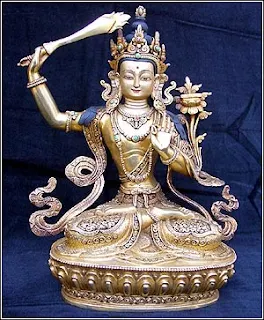 | |||
| Manjushree with sword of idea. ( Photo : Google ) |
The seventeenth century, Jal Vinayak Temple, Chobhar
( The god of elephant headed, the son of God Shiva )
Photo : Google
Rasuwa district, a part of Bagmati zone, is one of the seventy-five districts of Nepal.The district, with Dhunche as its district headquarters, covers an area of 1,544 km². The district has 108 natural lakes (kunda). So, it is called the district of 108 Kunda.
1) 108 Muktinath Dhara (natural 108 taps)
2
) Shree
Muktinath Temple
3) Damodar Kunda
4) Kagbani
5) Kagbhushundi Sarobar (lake)
6) God Muktinath with Shreedevi, Bhudevi
7) AgniJwala Ji (The god – Natural
fire-flame)
8) God Nrishimha (god Vishnu)
The famous
temple of Muktinath lies in
the district of Mustang and is situated on a high mountainside. It has 108 taps
around the temple. During the festival of Janai Purnima, Hindu devotees gather
at his spot to pay homage to Lord Muktinath.
- Nepal Tourism BoardTourist Service Center, P.O. Box - 11018
Bhrikutimandap, Kathmandu , Nepal
www.welcomenepal.com
Picture: unknown
A view of Swargadwari
Swargadwari, a place of Hindu Pilgrimage.There is the Swargadwari
Mahaprabhu Ashram ( hut ). Said to have been that the name
Swargadwari was derived from the Swargadwari Mahaprabhu.
The place also related to Five Pandab according to "Mahabharat".
During the festivals of Baisakh Poornima & Kartik Poornima, when
pilgrims from different parts of Nepal and India come to pay homage.
- Nepal Tourism Board
Tourist Service Center, P.O. Box - 11018
Bhrikutimandap, Kathmandu , Nepal
www.welcomenepal.com
Photo : Unknown
Shahid Gate ( Martyr's Memorial )
Photo : Google
Located on the way to Singha Darbar, the memorial arch containsthe statues of the late King Tribhuvan Bir Bikram Shah and other
four martyrs; namely Sukra Raj Shastri, Dharma Bhakta, Dashrath
Chand and Ganga Lal who led the foundation for the democratic
system on 1950-51.
- Nepal Tourism Board
Tourist Service Center, P.O. Box - 11018
Bhrikutimandap, Kathmandu , Nepal
www.welcomenepal.com
So, we should hearty respect souls of Martyrs & their living
families because they sacrificed their life for bright Nepal.
Golden Torana ( Golden gate ), Bhaktapur
- Nepal Tourism BoardTourist Service Center, P.O. Box - 11018
Bhrikutimandap, Kathmandu , Nepal
www.welcomenepal.com
Golden gate, Bhaktapur
Tourist Service Center, P.O. Box - 11018
Bhrikutimandap, Kathmandu , Nepal
www.welcomenepal.com
Exquisite wood carved windows, Kathmandu.
- Nepal Tourism BoardTourist Service Center, P.O. Box - 11018
Bhrikutimandap, Kathmandu , Nepal
www.welcomenepal.com
Picture: Wikipedia, the free encyclopedia
Desha Maru Jhya, which means the only window of its kind in the country, on a house in Kathmandu, Nardevi, Nepal. The height of this window is approximately 2 feet and width is 1.5 feet. It has historical importance of Nepal.
An artistic wooden strut, Patan.
- Nepal Tourism Board
Tourist Service Center, P.O. Box - 11018
Bhrikutimandap, Kathmandu , Nepal
www.welcomenepal.com
Famous Peacock Window ( Pujarimath )
- Nepal Tourism Board
Tourist Service Center, P.O. Box - 11018
Bhrikutimandap, Kathmandu , Nepal
www.welcomenepal.com
Chakrasambhara : he is the deity of highest yoga tantra and one of the
most popular forms of yidam deity among many buddhist practitioners.
Photo : Raju Bhandari ( B.L. Traders, Thamel, Kathmandu )
Chinnamasta- a shakti deity ( collection : Madan Chitrakar )
- Nepal Tourism Board
Tourist Service Center, P.O. Box - 11018
Bhrikutimandap, Kathmandu , Nepal
www.welcomenepal.com
Collection : Madan Chitrakar
- Nepal Tourism Board
Tourist Service Center, P.O. Box - 11018
Bhrikutimandap, Kathmandu , Nepal
www.welcomenepal.com
The 3 Km. cable car project was constructed
under strict supervision of Dopple Maier of Austria.
Approximately 10 to 15 minutes the cable car takes the visitors to the temple of Goddess Manakamana from
Chitwan, Kurintar ( besides Trisuli River ).It is an ancient Hindu temple of Nepal.
Goddess Manakamana who is believed to have the power to fulfil well wishes, that means Hindu people
believe Goddess Manakamana fulfils the wishes of her devotees.
People used to walk from Chitwan, Kurintar to Manakamana Temple, the top of the Gorkha hill before
the period of cable car.
Period of construction = November 1997- November 1998, highly successful.
It is open for public daily (without maintenance time).
Chandragiri Cable Car
Photo: Wikipedia, the free encyclopedia
Main Entrance of Chandragiri Cable Car, Thankot
The Advertisement of Chandragiri Cable Car Company
Main Entrance of Chandragiri Cable Car, Thankot
The Last Station of Chandragiri Cable Car, Chandragiri Hill
At The Top of The Chandragiri Hill, Bhaleshwar Mahadev temple / Restaurants
The Advertisement of Chandragiri Cable Car Company
Prime Minister Pushpa Kamal Dahal
officially inaugurated the Chandragiri Cable Car service in Chandragiri,
Kathmandu on December, 2016. Chandragiri Hills Ltd organised a special
programme to mark the official launching ceremony of the cable car service.
Chandragiri Cable Car is a gondola lift transportation system.It runs from Thankot to Chandragiri hills. The 2.4 km (9,095 ft) line has two way stations (indoor & outdoor).The cable car system consists of 38 gondolas that can carry 1,000 people per hour.
Chandragiri Cable Car is a gondola lift transportation system.It runs from Thankot to Chandragiri hills. The 2.4 km (9,095 ft) line has two way stations (indoor & outdoor).The cable car system consists of 38 gondolas that can carry 1,000 people per hour.
Chandragiri
is seven kilometers from Thankot, which lies on the south-west of Kathmandu
valley. The 2.4 kilometer journey passes through a spectacular forest and
natural landscapes.
At an altitude of 2,540 metres from the sea
level, the hilltop offers a breathtaking view of the Himalayan range and lush
green forests. The surrounding hills are often blanketed by fog with chilly
winds blowing. On a clear day, a row of Himalayan peaks extending from
Annapurna in the West to Everest in the East can be seen from the top.
A
one-way ticket costs Rs 450 and it costs Rs700 for a two-way ticket. Foreigners
are charged $22 per person, while the price for Saarc nationals is IRs700. - source
Rani Mahal, Palpa Tansen Darbar Tansen Darbar Square
Pictures- Google
Tansen is situated on the slopes of Srinagar Hill. Situated at an altitude of 1371 meters above sea level.
Among the most interesting objects in Tansen are a number of artistic temples, shrines and stupas which
closely resemble those of Kathmandu.
Tansen is the starting - point of many treks into the surrounding district of Palpa.
- Nepal Tourism Board
Tourist Service Center, P.O. Box - 11018
Bhrikutimandap, Kathmandu , Nepal
www.welcomenepal.com
Mai Pokhari - Ilam, Water-fall, Tea Garden - Ilam, The beautiful sunset view from Ilam, Shreeantu Hill
Pictures - Google
On the way are the villages of Chure Ghanti, Bakhaute, Dharapani, Jasbire Bhanjyang, Shreeantu,
Mai Pokhari & Tea Garden which offer pleasant & beautiful views.
It is an ancient Shrine.
Pathibhara Devi, Taplejung, Nepal
Photo :welcomenepal.com / Facebook
Photo: Naren Rai, Nepal
Halesi Mahadev Temple is the most ancient, holiest place of Khotang, Nepal; it is very popular as The Pashupatinath of the capital city of Nepal, Kathmandu. It is situated at the hilly region of the country in between the holy rivers – Dudh Koshi to the right and Sun Koshi to the left. The temple is situated at the top of a small hill inside a beautiful cave. There lie other some small beautiful caves too. The importance is here; the image of the god is inside the cave, which is full of natural beauty and cultural inheritance. Inside the cave is dark and there are bats flying here and there. Halesi Mahadev Temple is said to be six thousand years old.
- sources of the article Google
Photo: Facebook, tagged by Sundarprakash Sharma
Temple of Bala Tripura Sundari Bhagawati, Dolpa District, Tripurakot, Nepal
Temple of Bala Tripura Sundari Bhagawati is located at Tripurakot V.D.C of Dolpa District,
mid western of Nepal. It is an ideal, ancient, unique, holy place for rest and
relaxation.
Halesi Mahadev Temple is the most ancient, holiest place of Khotang, Nepal; it is very popular as The Pashupatinath of the capital city of Nepal, Kathmandu. It is situated at the hilly region of the country in between the holy rivers – Dudh Koshi to the right and Sun Koshi to the left. The temple is situated at the top of a small hill inside a beautiful cave. There lie other some small beautiful caves too. The importance is here; the image of the god is inside the cave, which is full of natural beauty and cultural inheritance. Inside the cave is dark and there are bats flying here and there. Halesi Mahadev Temple is said to be six thousand years old.
- sources of the article Google
Photo: Facebook, tagged by Sundarprakash Sharma
Temple of Bala Tripura Sundari Bhagawati, Dolpa District, Tripurakot, Nepal
Temple of Bala Tripura Sundari Bhagawati is located at Tripurakot V.D.C of Dolpa District,
mid western of Nepal. It is an ideal, ancient, unique, holy place for rest and
relaxation.
Ajayameru Kot, Dadeldhura, Nepal
Dadeldhura is a far -western district of Nepal.It lies in the Mahakali Zone of far-western
Nepal. The region has a desert-mountainous landscape that contains many local religious temples. The district is visited by tourists to Nepal, but contains local routes to Mt Kailaish in Tibet, Ra Ra Lake in Humla district and the last remaining remnants of the Far Western Malla Kingdom.
Ajayameru Kot is a village development commette in Dadeldhura District in the Mahakali Zone of western Nepal. It was a Capital of Doti kingdom founded by Niranjan dev in the 11th century. Nag Malla was the last royal to live here before Nepalese unification. He was built a Royal Palace in Ajayameru Kot in 8th century B. C. The place is also famous for archaeological remains. It is a histric site.
- source: Wikipedia, the free encyclopedia
- source: Wikipedia, the free encyclopedia
Pilgrims and local people believe that it is
one of the major holy place or power center of Goddess. One time in the year,
occasion of Janai Purnima, huge holy programme is celebrated. Thousands people
from all districts of far west, mid west (Karnali), India comes to participate
in that occasion every year.
The way of Badimalika is very difficult. There
is only one way to pilgrims. No cottage, tea house and other facilities
available. One should carry his daily food, cloths, tents and other needed
tools. Way also sloppy, dangerous and problematic. High altitude sickness also
suffers many pilgrims. Not only that, many rituals should follow by pilgrims.
So, one should prepare from all these challenges to visit Badimalika.
We have to trek around four days from Martadi.
(District headquarter of Bajura) It is suitable to tour only four months (Shrawan,
Bhadra, Asoj and Kartik) that means from second week of July, August,
September, October to second week of November. Other time snow covers all the
peaks, way and temple too. Finally it is very adventures tour.
We have categorized it in two ways;
1) Holy Tourism
2) Nature Tourism
Badimalika area is also famous for natural
beauty. Huge grounds, flowers, herbs, wild animals,
landscapes are beautiful and memorable. Badimalika Temple, Tribeni, Kheti-Beti and other side temples are holy
features.
"
Badimalika is paradise peace of Heaven"
- Source of this Article- http://hamrobadimalika.blogspot.com

































